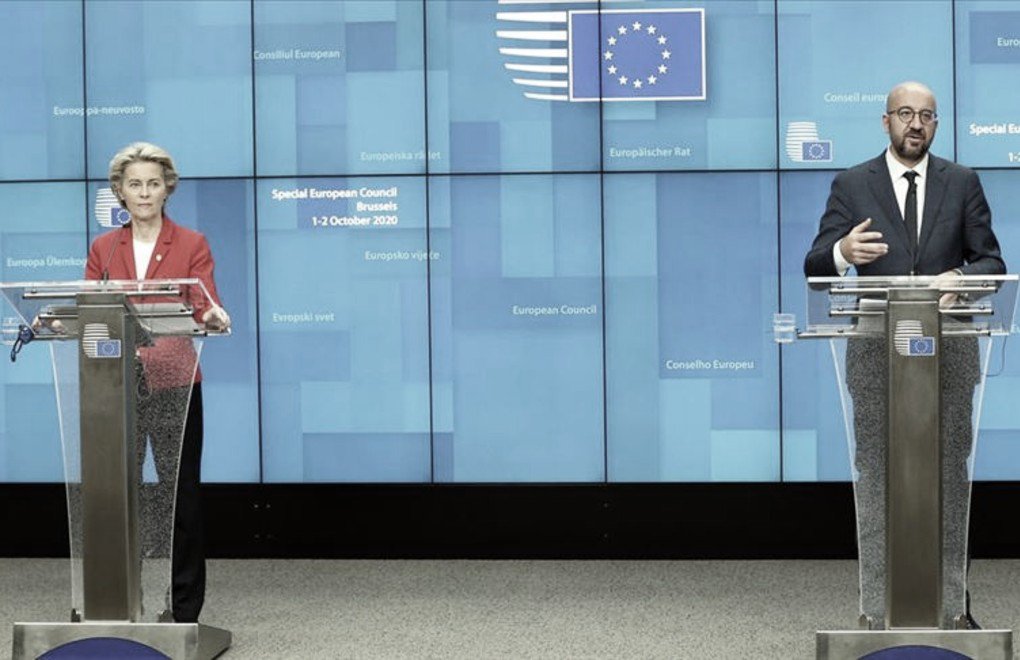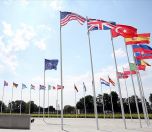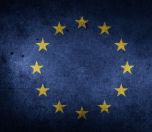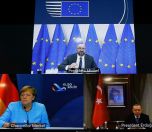Photo: AA
Click to read the article in Turkish
European Council President Charles Michel said today (October 2) that the bloc agreed to adopt "a two-track strategy" towards Turkey and wants to give a chance to constructive political dialogue but warned that all options are on the table if that was not the case.
"We want to give a chance to political dialogue. But in case of renewed provocations we will use all instruments at our disposal," he remarked at a news conference following the EU leaders' summit.
Michel said the main discussions of the gathering focused on the current situation in the Eastern Mediterranean and EU-Turkey relations along with sanctions on Belarus.
He said the EU pact encouraged political dialogue based on common interests but added that the EU offered full support for Greece and the Greek Cypriot administration and noted that the bloc expected Ankara to take positive steps.
According to Michel, the EU would rather have a positive agenda with Turkey, which it expects not to take any unilateral steps. He said the European pact also supports efforts to establish a dialogue between Athens and Ankara and the restart of Cyprus negotiations under the auspices of the UN.
Stating that the leaders taking part in the event suggested establishing a multilateral conference to resolve disputes in the Eastern Mediterranean, he further noted that the EU Council would monitor developments and re-evaluate the issue once again in December.
Von der Leyen warns Turkey against "unilateral actions"
EU Commission President Ursula Von der Leyen, also speaking at the news conference, said the European pact called for collaboration with Turkey based on a positive agenda but she reiterated that the EU supported Greece and the Greek Cypriots.
She welcomed the start of a reliable dialogue between Athens and Ankara but noted that the EU regretted the latter's attitude towards the Greek Cypriot administration, which it does not recognize.
Von der Leyen warned that the EU would utilize all instruments and options should Turkey take unilateral actions, but the bloc did not prefer this, as positive relations would benefit both sides.
She noted that updating the Customs Union, improving commercial relations and cooperating in terms of migration should be on the agenda of both Turkey and the EU, especially at a time when the Covid-19 pandemic has inflicted a heavy blow on international trade.
European Council calls for dialogue between Turkey and Cyprus
In a statement released after the meeting, the European Council condemned Turkey for "violations of the sovereign rights of the Republic of Cyprus."
It called on Turkey to abstain from similar actions in the future and accept the invitation of dialogue with the objective of settling all maritime-related disputes with Cyprus, which Turkey doesn't recognize.
"The EU stands ready to play an active role in supporting the negotiations, including by appointing, upon resumption, a representative to the UN Good Offices Mission," it further said.
According to the statement, EU foreign policy chief Josep Borrell was asked to organize a multilateral Eastern Mediterranean conference where multiple issues such as maritime jurisdiction areas, security, energy, migration and economic cooperation would be discussed. The participants, format and date are yet to be negotiated on.
Merkel calls for a diplomatic solution
German Chancellor Angela Merkel yesterday called for a diplomatic solution to tensions in the Eastern Mediterranean and underlined the importance of developing "constructive" relations with Turkey.
Speaking to reporters in Brussels ahead of a key summit of European leaders, Merkel said Germany's EU term presidency will continue its efforts to find a peaceful solution to rising tensions in the region.
"Our relations with Turkey are highly complex. Despite all the difficulties, the EU has a great interest in developing constructive relations with Turkey," she stressed.
Merkel reiterated the bloc's solidarity with EU members Greece and the Greek Cypriot administration but did not extend support for their call to impose additional sanctions against Turkey, due to recent tensions in the Eastern Mediterranean.
The chancellor also underlined the importance of continued cooperation with Ankara on issues of common interest.
"We're partners in NATO. We're dependent on one another in addressing irregular migration," she said and reaffirmed the EU's continued support to Turkey for hosting almost four million Syrian refugees.
Timeline of the Eastern Mediterranean crisisThe tension between Turkey and Greece over their right to explore energy resources in the Eastern Mediterranean has seriously escalated over the last months. The latest developments leading to this escalation are briefly as follows: On July 21, Turkey issued its first Navtex alert for Oruç Reis seismic vessel's exploration activities in the Eastern Mediterranean. On July 28, Turkey announced after Germany's diplomatic efforts that it suspended hydrocarbon exploration activities and stated that it was ready to talk with Greece. On August 6, Greece and Egypt signed a maritime border agreement. On August 10, Turkey announced that its drillship Oruç Reis would resume energy exploration in the Eastern Mediterranean. It said the ship will continue its work along with the ships Cengiz Han and Ataman until August 23. On August 14, the EU foreign miniters discussed the crisis at an extraordinary meeting, calling on Turkey to end hydrocarbon exploration activities in contested waters. On August 16, Turkey issued a Navtex, announcing that its drill ship Yavuz will continue its work exploring for energy resources off the island of Cyprus. On August 23, Turkey issued another Navtex, stating that the Oruç Reis vessel would continue its activities until August 27. On August 24, Greece held joint naval drills with the US in the south of Crete island. One day later, Turkey conducted naval exercises with Italy. On August 25, Germany's Minister of Foreign Affairs Heiko Maas visited Athens and Ankara to encourage the two countires to have direct talks. On the same day, Turkey held replenishment exercises with Italy in the Eastern Mediterranean. On August 26, US President Donald Trump had phone talks with President Recep Tayyip Erdoğan and Prime Minister of Greece Kyriakos Mitsotakis, urging them to reduce tensions and start dialogue. On the same day, Turkey and the US conducted joint maritime exercises. On August 27 and 28, EU foreign ministers met with the Eastern Mediterranean crisis on the top of their agenda. The Union's foreign polict head Josep Borrell said after the meeting that Turkey's ships might be sanctioned if they continued hydrocarbon activities. Turkey's Ministry of National Defense on August 28 announced that it intercepted six F-16 fighters planes of Greece, which it said were closing in on the area where Turkey issued a Navtex. On September 1, the US lifted the arms embargo on Southern Cyprus. On September 2, Turkey issued two Navtex alerts for Russia's gunnery exercises in the Eastern Mediterranean. It was stated that Russia would conduct exercises in two different areas that correspond to Turkey's hydrocarbon exploration activities on the east and west of the Cyprus island. On September 3, NATO Secretary General Jens Stoltenberg said, "Following my discussions with Greek and Turkish leaders, the two Allies have agreed to enter into technical talks at NATO to establish mechanisms for military deconfliction to reduce the risk of incidents and accidents." On September 4, Prime Minister of Greece Kyriakos Mitsotakis said that Greece would only enter into a dialogue with Turkey if it "stops provocations" in the Eastern Mediterranean. Shortly before this statement, Turkey's Foreign Ministry stated, "Turkey is ready to enter into dialogue with Greece without any preconditions." On September 10, military delegations from Turkey and Greece had technical talks at NATO headquarters to prevent military engagement. On Septemebr 15, issuing a new NAVTEX alert for the Chios Island of Greece, Turkey argued that Greece had militarized Chios Island in violation of the 1923 Lausanne Peace Treaty. The military delegations from the two countries held the second technical meeting. On September 17, the European Parliament warned Turkey of sanctions if it continues its hydrocarbon exploration activities. On September 18, Turkey summoned Greece's envoy over a newspaper headline about President Erdoğan. On September 21, the US stated that it does not consider the Seville Map on the maritime borders of Turkey and Greece as a document that has legal significance. On October 1, A military deconfliction mechanism has been established between Turkey and Greece. On October 2, The EU stated after its leaders' summit that it wanted to give a chance to constructive political dialogue but warned that all options were on the table if that was not the case. |
(PT/VK)










